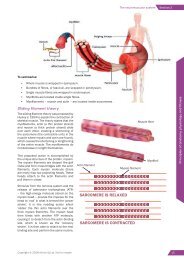Active IQ Level 3 Diploma in Health and Fitness (sample manual)
For more information, please visit http://www.activeiq.co.uk/qualifications/level-3/active-iq-level-3-diploma-in-health-and-fitness
For more information, please visit http://www.activeiq.co.uk/qualifications/level-3/active-iq-level-3-diploma-in-health-and-fitness
Create successful ePaper yourself
Turn your PDF publications into a flip-book with our unique Google optimized e-Paper software.
If all these needs are met, either with<strong>in</strong> a work<strong>in</strong>g environment or elsewhere, the <strong>in</strong>dividual will be motivated<br />
to achieve the top level of the pyramid, which is referred to as ‘self-actualisation’. This is the po<strong>in</strong>t at which<br />
the person arrives at their set goal <strong>and</strong> where they beg<strong>in</strong> to feel fulfilled, successful <strong>and</strong> truly motivated. If<br />
Maslow’s ‘hierarchy of needs’ are met for employees with<strong>in</strong> an organisation those <strong>in</strong>dividuals will become<br />
highly motivated <strong>and</strong> effective members of that organisation.<br />
The Motivation Hygiene Theory<br />
Another important th<strong>in</strong>ker <strong>in</strong> motivation theory is the American, Frederick Herzberg. Herzberg carried out<br />
a series of experiments to f<strong>in</strong>d out what led to satisfaction <strong>and</strong> dissatisfaction at work. The factors that<br />
related to satisfaction he called ‘motivators’, <strong>and</strong> those that led to dissatisfaction he called ‘de-motivators’<br />
or ‘hygiene factors’ - hence the title of his work, the ‘Motivation Hygiene Theory’.<br />
The th<strong>in</strong>k<strong>in</strong>g beh<strong>in</strong>d the theory is that although good hygiene does not particularly make you well, it can<br />
prevent you from becom<strong>in</strong>g unwell. In the same way, even if ‘de-motivators’ or ‘hygiene factors’ are<br />
addressed <strong>in</strong> the workplace, this does not necessarily br<strong>in</strong>g about job satisfaction. If ignored, however, their<br />
presence will <strong>in</strong>crease the chances of dissatisfaction <strong>in</strong> the workplace.<br />
Herzberg’s ‘motivators’ were:<br />
• achievement<br />
• recognition<br />
• the job itself<br />
• responsibility<br />
• advancement <strong>and</strong> growth<br />
If these are present, they tend to make people feel good about their job. The ‘hygiene factors’ or the ‘demotivators’<br />
<strong>in</strong>cluded:<br />
• company policy<br />
• adm<strong>in</strong>istrative arrangements<br />
• supervision<br />
• relationships with supervisors, peers <strong>and</strong> subord<strong>in</strong>ates<br />
• work<strong>in</strong>g conditions<br />
• salary<br />
• issues <strong>in</strong> the person’s personal life<br />
• status<br />
• security<br />
So how does this translate <strong>in</strong>to motivat<strong>in</strong>g staff? Put simply, if an <strong>in</strong>dividual is employed with<strong>in</strong> what they<br />
consider to be a ‘dead end’ job with limited prospects, or they are employed on a part-time casual contract<br />
with no security of tenure they are unlikely to be truly motivated. These are the very people that under<br />
McGregor’s ‘XY theory’ will become theory X type employees.<br />
List the th<strong>in</strong>gs that make you feel good about your job.<br />
List the th<strong>in</strong>gs that make you feel fed up about your job.<br />
Consider how each relates to Herzberg’s theory.<br />
Motivation methods<br />
What are the best methods to motivate <strong>and</strong> support the people with<strong>in</strong> your team?<br />
Activity<br />
Copyright © 2019 <strong>Active</strong> <strong>IQ</strong> Ltd. Not for resale | 11

















